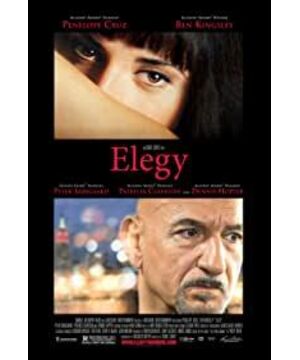The movie "Elegy" is adapted from the novel "THE DYING ANIMAL", the Chinese translation is "dying flesh", which is very appropriate.
An erudite professor who is "innately unrestrained and free-spirited", falls in love with his student, a beautiful woman with a living body, as she approaches old age. But the always respected old professor suddenly became unconfident before he fell in love. He always thought that young women would abandon him because of his old age, but he was so addicted to this relationship that he was jealous , Suspicion, selfishness, and ultimately ruined the relationship because of inferiority. They seem to be back together again until the young woman finds him for a breast cut to cure cancer. Maybe because of this way, the professor regained his confidence?
This film is very artistic, but what is touching is that a person who is still in good spirits has to face his own aging age. Although he does not have any age restrictions in all aspects, the social The law made it impossible for him to fall in love with whoever he wanted as he did when he was young. Although he is so famous, learned, and confident, he cannot match the meaning given to time (age) by society, so he must bow his head in front of the society and admit that he loves someone who should not or should not be loved. In the end, he chose Let go of this relationship. I think the movie is especially profound when it depicts this emotion. For everyone who is about to get old, although we are still full of vitality, we have to face the definition given to us by society, although we are so reluctant and so resistant, but in the end we still have to reach that The corners that society has arranged for us. Young women are reserved for young people, and we are not qualified to love. Only a few can jump out of the laws of society, and the reality is so cruel for the vast majority of people, even in an open America.
This poster belongs to the female protagonist Penelope, and her gesture is in line with the Goya painting "Mara in Clothes" mentioned in the play, because the professor said that their eyes are very similar. This is where the lethality of European art films is. The soundtrack is by Bach or Satie, it's about Goya and Tolstoy, and the real themes can strike a nerve. Therefore, the charming style and profound meaning always make people watch it several times.
View more about Elegy reviews











